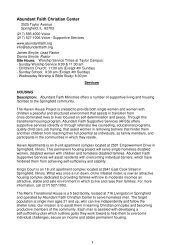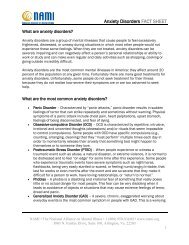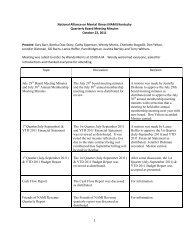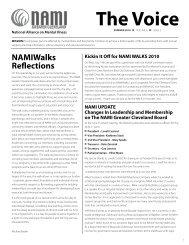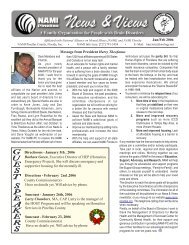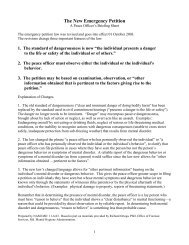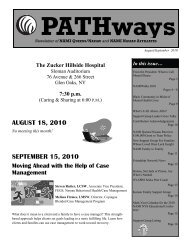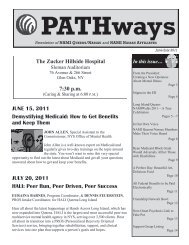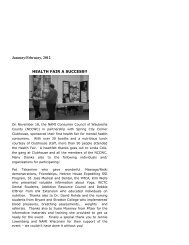Advocacy Committee Meets Congressman John Linder - NAMI
Advocacy Committee Meets Congressman John Linder - NAMI
Advocacy Committee Meets Congressman John Linder - NAMI
You also want an ePaper? Increase the reach of your titles
YUMPU automatically turns print PDFs into web optimized ePapers that Google loves.
'%()! $$(!<br />
(Continued from page 2)<br />
not get worse with time.<br />
What are other examples of<br />
behaviors typical of people who<br />
suffer from OCD?<br />
People who do the following may have<br />
OCD:<br />
• repeatedly check things, perhaps<br />
dozens of times, before feeling<br />
secure enough to go to sleep or<br />
leave the house. Is the stove off?<br />
Is the door locked? Is the alarm<br />
set?<br />
• fear they will harm others.<br />
Example: A man's car hits a<br />
pothole on a city street and he<br />
fears it was actually a body.<br />
• feel dirty and contaminated.<br />
Example: A woman is fearful of<br />
touching her baby because she<br />
might contaminate the child.<br />
• constantly arrange and order<br />
things. Example: A child can't go to<br />
sleep unless he lines up all his<br />
shoes correctly.<br />
• are excessively concerned with<br />
body imperfections -- insist on<br />
numerous plastic surgeries, or<br />
spend many, many hours a day<br />
body-building.<br />
• are ruled by numbers, believing<br />
that certain numbers represent<br />
good and others represent evil.<br />
• are excessively concerned with sin<br />
or blasphemy.<br />
Is OCD commonly recognized by<br />
professionals?<br />
Not nearly commonly enough. OCD is<br />
often misdiagnosed, and it is often<br />
under diagnosed. Many people have<br />
dual disorders of OCD and<br />
schizophrenia, or OCD and bipolar<br />
disorder, but the OCD component is<br />
not diagnosed or treated. In children,<br />
parents often are aware of some<br />
anxiety or depression but not of the<br />
underlying OCD. Researchers believe<br />
OCD, anxiety disorders, Tourette's,<br />
and eating disorders such as anorexia<br />
and bulimia can be triggered by some<br />
"!# $%! !&<br />
of the same chemical malfunctioning of<br />
the brain.<br />
Is heredity a factor in OCD?<br />
Yes. Heredity appears to be a strong<br />
factor. If you have OCD, there's a 25percent<br />
chance that one of your<br />
immediate family members will have it.<br />
It definitely seems to run in families.<br />
Can OCD be effectively treated?<br />
Yes, with medication and behavior<br />
therapy. Both affect brain chemistry,<br />
which in turn affects behavior.<br />
Medication can regulate serotonin,<br />
reducing obsessive thoughts and<br />
compulsive behaviors.<br />
Anafranil (clomipramine): A tricyclic<br />
antidepressant, Anafranil has been<br />
shown to be effective in treating<br />
obsessions and compulsions. The<br />
most commonly reported side effects<br />
of this medication are dry mouth,<br />
constipation, nausea, increased<br />
appetite, weight gain, sleepiness,<br />
fatigue, tremor, dizziness,<br />
nervousness, sweating, visual<br />
changes, and sexual dysfunction.<br />
There is also a risk of seizures,<br />
thought to be dose-related. People<br />
with a history of seizures should not<br />
take this medication. Anafranil should<br />
also not be taken at the same time as<br />
a monoamine oxidase inhibitor (MAOI).<br />
Many of the antidepressant<br />
medications known as selective<br />
serotonin reuptake inhibitors (SSRIs)<br />
have also proven effective in treating<br />
the symptoms associated with OCD.<br />
The SSRIs most commonly prescribed<br />
for OCD are Luvox (fluvoxamine), Paxil<br />
(paroxetine), Prozac (fluoxetine), and<br />
Zoloft (sertraline).<br />
Luvox (fluvoxamine): Common side<br />
effects of this medication include dry<br />
mouth, constipation, nausea,<br />
sleepiness, insomnia, nervousness,<br />
dizziness, headache, agitation,<br />
weakness, and delayed ejaculation.<br />
Paxil (paroxetine): Side effects most<br />
associated with this medication include<br />
dry mouth, constipation, nausea,<br />
decreased appetite, sleepiness,<br />
insomnia, tremor, dizziness,<br />
nervousness, weakness, sweating,<br />
and sexual dysfunction.<br />
!*<br />
Prozac (fluoxetine): Dry mouth,<br />
nausea, diarrhea, sleepiness,<br />
insomnia, tremor, nervousness,<br />
headache, weakness, sweating, rash,<br />
and sexual dysfunction are among the<br />
more common side effects associated<br />
with this drug.<br />
Zoloft (sertraline): Among the side<br />
effects most commonly reported while<br />
taking Zoloft are dry mouth, nausea,<br />
diarrhea, constipation, sleepiness,<br />
insomnia, tremor, dizziness, agitation,<br />
sweating, and sexual dysfunction.<br />
Celexa (Citalopram) Side effects may<br />
include dry mouth, nausea, or<br />
drowsiness .<br />
SSRIs should never be taken at the<br />
same time as MAOIs.<br />
How log should an individual take<br />
medication before judging its<br />
effectiveness?<br />
Some physicians make the mistake of<br />
prescribing a medication for only three<br />
or four weeks. That really isn't long<br />
enough. Medication should be tried<br />
consistently for 10 to 12 weeks before<br />
its effectiveness can be judged.<br />
What is behavior therapy, and can it<br />
effectively relieve symptoms of<br />
OCD?<br />
Behavior therapy is not traditional<br />
psychotherapy. It is "exposure and<br />
response prevention," and it is<br />
effective for many people with OCD.<br />
Consumers are deliberately exposed<br />
to a feared object or idea, either<br />
directly or by imagination, and are then<br />
discouraged or prevented from<br />
carrying out the usual compulsive<br />
response. For example, a compulsive<br />
hand-washer may be urged to touch<br />
an object he or she believes is<br />
contaminated and denied the<br />
opportunity to wash for several hours.<br />
When the treatment works well, the<br />
consumer gradually experiences less<br />
anxiety from the obsessive thoughts<br />
and becomes able to refrain from the<br />
compulsive actions for extended<br />
periods of time.<br />
(Continued on page 4)



